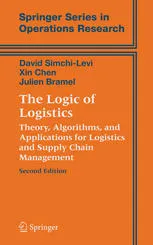The Logic of Logistics: Theory, Algorithms, and Applications for Logistics and Supply Chain Management
4.9
Reviews from our users

You Can Ask your questions from this book's AI after Login
Each download or ask from book AI costs 2 points. To earn more free points, please visit the Points Guide Page and complete some valuable actions.Related Refrences:
Introduction
Welcome to The Logic of Logistics: Theory, Algorithms, and Applications for Logistics and Supply Chain Management, a comprehensive resource dedicated to the intricate and evolving world of logistics and supply chain management. Authored by David Simchi-Levi, Xin Chen, and Julien Bramel, this book bridges the gap between theoretical models and practical applications, providing a robust foundation for both researchers and professionals navigating this multifaceted discipline.
The third edition of this text dives deep into the mathematical models, algorithms, and theories that form the backbone of supply chain logistics. It integrates modern insights and tools to address real-world challenges. It appeals to an audience spanning from supply chain analysts, academicians, and graduate students to managers aiming to enhance the efficiency of their operations through data-driven strategies. With its balance of rigor and application, it elegantly caters to the dual objectives of understanding and implementing supply chain optimization.
Detailed Summary of the Book
One of the book’s primary strengths lies in its structured approach to unpacking logistics and supply chain issues.
The book opens with a deep dive into the mathematical foundations of logistics optimization, equipping readers with core principles necessary for solving logistical problems. Drawing on optimization techniques, probability, and algorithms, it establishes the groundwork for later chapters.
It progressively delves into specific topics such as inventory management, network design, vehicle routing, and dynamic programming within the context of supply chains. These areas are presented systematically, with real-world examples that demonstrate the conceptual and computational tools needed to solve practical challenges.
A key focus of the book is the balance between centralized and decentralized supply chain management. By incorporating case studies, the authors showcase the effects of collaboration, information sharing, and diverse business strategies on operational performance. Readers will also find discussions on emerging trends like e-commerce, sustainability considerations, and the influence of technology such as blockchain and machine learning on logistics systems.
Throughout the chapters, the authors provide detailed algorithmic insights, making complex techniques accessible even to readers with limited programming knowledge. The practical examples and exercises included encourage hands-on learning, where concepts can be implemented and tested in a simulated or actual business environment.
Key Takeaways
This book delivers several essential lessons for professionals and researchers alike:
- Theoretical frameworks in logistics are essential for efficient decision-making, but their success lies in accurate real-life application.
- Optimization techniques, from linear programming to heuristics, are critical tools for tackling complex supply chain challenges.
- Effective collaboration and information sharing within supply chains can significantly improve operational outcomes.
- Logistics is not only about cost minimization but also service level optimization and strategic growth potential.
- Emerging trends like digital transformation and sustainability are reshaping the logistics landscape, making it crucial for future-proof supply chain strategies.
Famous Quotes from the Book
Here are some thought-provoking insights from the authors:
"The interplay between cost, customer satisfaction, and systemic risk defines the art and science of logistics management."
"A supply chain is only as resilient as its weakest link, and identifying that link is where strategic intelligence begins."
"The most powerful supply chains are those that harmonize integration, visibility, and flexibility."
Why This Book Matters
In today’s highly interconnected and competitive global economy, supply chain management is at the heart of every successful business. Decisions made at every step—from procurement to distribution—impact not just operational costs but also a company’s ability to meet market demand and navigate disruptions.
The Logic of Logistics stands out as a vital resource in this landscape because it transcends theoretical discussions and directly addresses operational challenges. Its emphasis on both classical models and cutting-edge trends ensures its relevance in academic, professional, and applied contexts.
From Fortune 500 companies mastering global supply chains to startups aiming for efficient product deliveries, the principles outlined in this book apply universally. By equipping readers with the tools to model, analyze, and optimize logistics systems, the authors ensure that their work remains a cornerstone for understanding and excelling in the realm of modern supply chain management.
Free Direct Download
You Can Download this book after Login
Accessing books through legal platforms and public libraries not only supports the rights of authors and publishers but also contributes to the sustainability of reading culture. Before downloading, please take a moment to consider these options.
Find this book on other platforms:
WorldCat helps you find books in libraries worldwide.
See ratings, reviews, and discussions on Goodreads.
Find and buy rare or used books on AbeBooks.
1079
بازدید4.9
امتیاز0
نظر98%
رضایتReviews:
4.9
Based on 0 users review
Questions & Answers
Ask questions about this book or help others by answering
No questions yet. Be the first to ask!





![The Ultimate iOS Interview Playbook: Conquer Swift, frameworks, design patterns, and app architecture [Team-IRA]](https://s3.refhub.ir/images/thumb/The_Ultimate_iOS_Interview_Playbook__Conquer__29925.webp)







